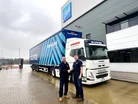Woodland Group and Ball Trial Electric Vehicles and HVO Fuel

Woodland Group, a global logistics firm, is taking steps towards reducing its environmental impact, having already achieved several green milestones in recent months.
With its focus on transparency and social responsibility, Woodland has earned gold EcoVadis certification and installed solar panels providing more than 60% renewable energy at key sites.
Woodland Group, in collaboration with Ball Corporation, the largest aluminium packaging supplier, is piloting the use of hydrotreated vegetable oil (HVO) as a renewable diesel alternative.
Since March 2024, Woodland has completed 1,100 trips using HVO on Ball's regular routes. The results show a massive reduction in CO2 emissions—just 22 tonnes compared to the 229 tonnes they would have emitted using conventional diesel.
This trial alone cut emissions by 207 tonnes, an impressive 90.44% reduction. Based on these results, Woodland Group and Ball project they could save 1,067 tonnes of CO2e emissions over the next 12 months.
The companies plan to expand this approach to additional routes as part of their broader goal of achieving net zero emissions.
Exploring electric vehicles for freight
Alongside HVO, Woodland and Ball are testing electric heavy goods vehicles (EHGVs). A recent 30-day trial saw Volvo EHGVs reduce the fleet’s carbon footprint by 65.66% compared to diesel vehicles.
Though limited by the UK’s current electrical infrastructure, Woodland remains optimistic about the potential for EHGVs. They continue to work with Ball and other manufacturers to explore the market and learn how best to implement these technologies.
As Woodland Group’s Global Head of Fulfilment, Luke Fermor, explained: “The key is to have a better understanding of emerging technologies and to ensure we invest in the right technology at the right time.”
Future of sustainable transport
Woodland Group and Ball are committed to continuing their search for effective green transport solutions. Trials so far have highlighted both the challenges and opportunities ahead.
The logistics sector is still heavily reliant on diesel due to its established infrastructure, but alternative fuels and vehicles offer promise. While electric vehicles produce fewer emissions per kilometre, they are currently limited by range and grid capacity.
HVO, on the other hand, is emerging as an ideal short-term solution, offering low emissions and compatibility with existing engines. There’s also growing interest in hydrogen technology, which both companies plan to trial in the near future.
Mark Haslam, Logistics Director for EMEA at Ball, emphasises the importance of collaboration: “No single company can tackle the challenge alone; working together is crucial.”
He adds that Ball’s partnership with Woodland, formed in 2021, is focused on finding “carbon-conscious solutions” to reduce emissions across the supply chain.
With Woodland Group already powering 25% of its fleet with HVO fuel, both companies are taking significant steps to reduce their carbon footprints and pioneer sustainable logistics solutions. Their partnership demonstrates how purpose-driven organisations can work together to drive real change in the industry.
Receive the next edition of Scope 3 Magazine by signing up for its newsletter.
As part of this portfolio, make sure you check out Procurement Magazine and also sign up to our global conference series - Procurement & Supply Chain LIVE.
Also check out our sister brand, Sustainability Magazine and sign up to its global conference series - Sustainability LIVE.
Scope 3 Magazine is a BizClik brand.

